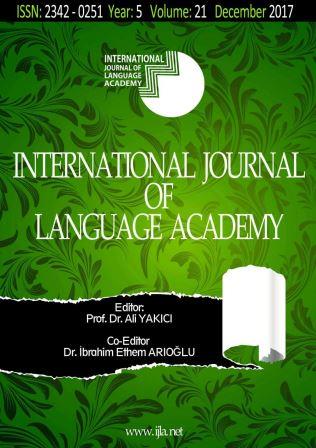Author :
Abstract
Bu çalışmada 2010 yılında Tunus’ta başlayarak Mısır, Suriye ve Yemen gibi Arap ülkelerine yayılan ve tüm dünyada geniş yankı uyandıran Arap Baharı sürecinde ve sonrasında, gerek bölgeye fiziki yakınlığı gerekse bölgeyle olan çeşitli ilişkileri nedeniyle söz konusu süreçten etkilenmesi kaçınılmaz olan Türkiye’de Arapça öğretiminde yaşanan gelişmeler incelenmiştir. Nitel bir araştırma olan bu çalışmada konuyla ilgili çeşitli resmi ve gayri resmi kurum ve kuruluşlar tarafından yayınlanmış dokümanların incelenmesiyle elde edilen veriler aracılığıyla bazı bulgulara ulaşılmıştır. Bahsi geçen gelişmeler şu üç ana başlık altında derlenmiştir: (1) yükseköğretimde gözlenen değişimler, (2) imam hatip okulları ve diğer örgün ilk, ortaokul ve liselerde gözlenen değişimler ve (3) diğer değişimler. Yükseköğretim alanında yaşanan değişimler kısmında üniversitelerde Arap dili eğitimi ile alakalı yaşanan değişimlere ve Arap dilinin öğretilmesi hususunda kaydedilen akademik gelişmelere değinilmiştir. İmam hatip okulları ve diğer okullarda yaşanan değişimler kısmında ise Milli Eğitim Bakanlığı’nın sunduğu ve elde edilen diğer belgelerden yola çıkarak Arap dilinin öğretimi hususundaki gelişmeler incelenmiştir. Diğer değişimler başlığı altında, başvuran adayların Arapça bilgisini ölçmek için Türkiye’de merkezi olarak Ölçme Seçme ve Yerleştirme Merkezi tarafından yapılan Kamu Personeli Dil Sınavı ve Yabancı Dil Sınavına ait bazı veriler sunulmuştur ve bunlardan hareketle Arap dilinin öğrenimine yönelik rağbet hususunda bazı çıkarımlara ulaşılmıştır. Çalışmanın sonunda elde edilen veriler analiz edilerek çeşitli sonuçlara ulaşılmıştır.
Keywords
Abstract
In this article, the developments in teaching of the Arabic language in Turkey after the Arab Spring are examined. Began in Tunisia in 2010, the Arab Spring swiftly spread to other Arabic countries such as Egypt, Syria, and Yemen, and shocked the world. Due not only to the physical proximity of Turkey to the Arab countries but also to the miscellaneous relationships between Turkey and the Arab countries, the Arab Spring made an ineluctable impact on the teaching of the Arabic language in Turkey. This article, which is a qualitative study, reaches to some findings by examining the documents published by various official and non-official institutions. The developments at hand are compiled under three headings: (1) the changes in higher education, (2) the changes in Imam Hatip schools and other schools, be they primary, secondary or high schools, which provide formal education, and (3) other changes. The changes in the higher education are divided into two categories as the changes in the teaching of the Arabic language in universities and the academic changes in the teaching of the Arabic language. As for the changes in the Imam Hatip schools and other schools, the data provided by the Ministry of National Education and other data are examined to understand the transformation of the teaching of the Arabic language. For the other changes in question, the data provided by ÖSYM (Measuring, Selection, and Placement Center) and KPDS-YDS (Language Proficiency Test) are analyzed and some deductions regarding the popular demand towards the education of Arabic language are reached. Various general conclusions are given at the end of the study by the overall analyzation of the data.
